Did you know that the cryptocurrency market in Singapore is anticipated to grow by 8.79% from 2024 to 2028? This growth is expected to result in a market volume of US$479.5 million in 2028.
The data indicates the development of blockchain in Singapore is bringing a promising future for the market.
Well, Singapore is using blockchain in different sectors. Banks use RippleNet for quick transactions and DLT Ledgers secure supply chains. Real estate uses Averspace for smooth deals. Governments explore blockchain for transparency.
In addition, there are regular launches of blockchain and bitcoin courses, as well as some innovative programs. In this blog, we’ve explained everything about blockchain development in Singapore along with the best blockchain development company in Singapore; Webisoft.
So, keep on reading.
Contents
- 1 The Rise of Blockchain in Singapore
- 1.1 1. Project Ubin Boosts Blockchain
- 1.2 2. Government Support Sparks Innovation
- 1.3 3. Focus on Blockchain Education
- 1.4 4. Solid Regulations for Safety
- 1.5 5. Growing Startup Scene and Investments
- 1.6 6. Global Recognition and Rankings
- 1.7 7. International Events Boost Hub Status
- 1.8 8. Blockchain’s Impact on Singapore
- 2 How Does Blockchain Work: The Transaction Process
- 3 Blockchain Applications in Singapore
- 4 Blockchain and Bitcoin Courses in Singapore
- 4.1 1. Foundational Course: Basic Blockchain and Bitcoin Course
- 4.2 2. Business Applications: Blockchain – Embarking on the Journey
- 4.3 3. Decentralized Finance: A New Financial Ecosystem
- 4.4 4. Hands-on Development: Introduction to Blockchain Technology with Ethereum & Solidity Smart Contracts
- 4.5 5. FinTech Expertise: Singapore Polytechnic
- 5 Industries Leveraging Blockchain in Singapore
- 6 The Future of Blockchain Technology in Singapore: How Much Will It Evolve?
- 6.1 Supportive Regulatory Framework
- 6.2 Investment in Research and Development
- 6.3 Financial Sector Innovation
- 6.4 Vibrant Ecosystem
- 6.5 Focus on Blockchain Education and Talent Development
- 6.6 Increased Adoption
- 6.7 Continued Transformation
- 6.8 Collaboration and Partnerships
- 6.9 Talent Growth and Expertise
- 7 Singapore Blockchain Innovation Programme: Blockchain Incubator Program
- 8 Best Blockchain Development Company in Singapore: Webisoft
- 9 Why Choose Webisoft?
- 10 Final Words
The Rise of Blockchain in Singapore
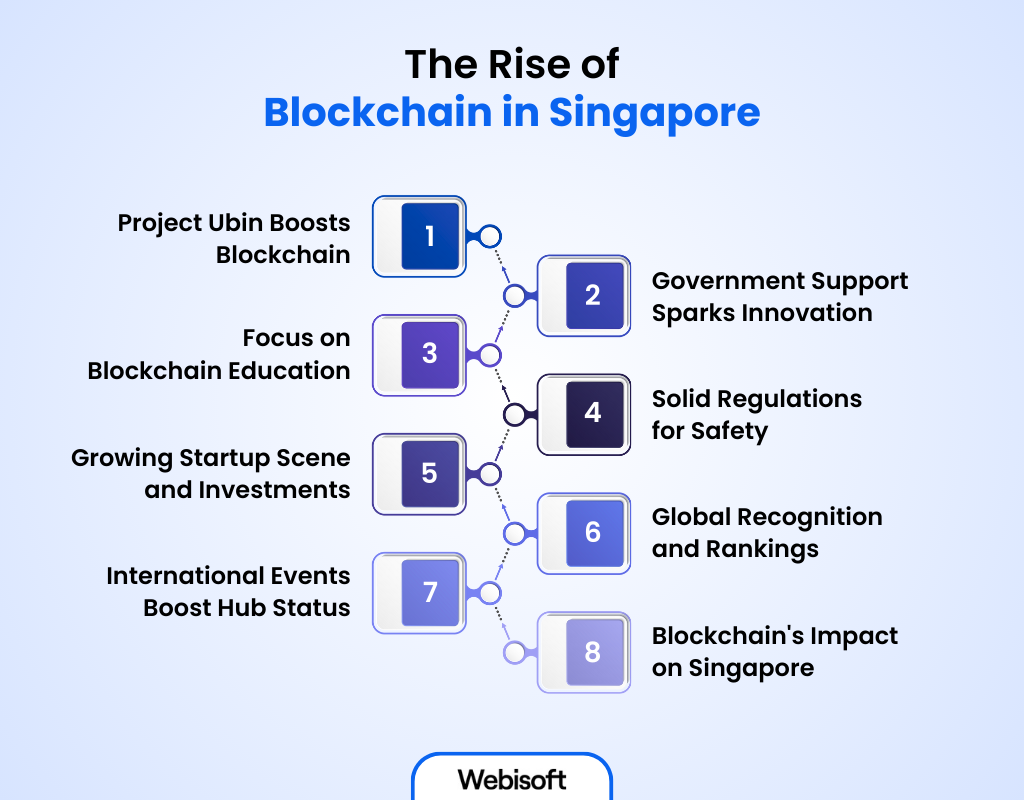
Paying attention to 8 facts we can understand the rise of blockchain in Singapore. Let’s check it
1. Project Ubin Boosts Blockchain
In 2016, Singapore’s Monetary Authority (MAS) started Project Ubin to explore how blockchain could be used for bank payments and securities. This made Singapore a global hub for blockchain research.
2. Government Support Sparks Innovation
The government launched the Blockchain Challenge in 2019, encouraging companies to create new blockchain solutions. This has led to more creativity and growth in Singapore’s blockchain community.
3. Focus on Blockchain Education
Singapore is serious about teaching blockchain. The Singapore University of Social Sciences (SUSS) offers courses, and there are conferences and workshops for learning and skill-building.
4. Solid Regulations for Safety
Singapore’s strong regulations, like the 2019 Payment Services Act, guide cryptocurrency and digital payments to keep people safe and prevent illegal activities.
5. Growing Startup Scene and Investments
Startups and businesses in Singapore have a great environment for blockchain ideas. They received around $1.48 billion in investments in 2021, making the city a top spot globally.
6. Global Recognition and Rankings
Singapore hosts 6% of the world’s crypto funds. They are now ranking among the top three countries globally with Switzerland and Hong Kong, just behind the United States and the United Kingdom.
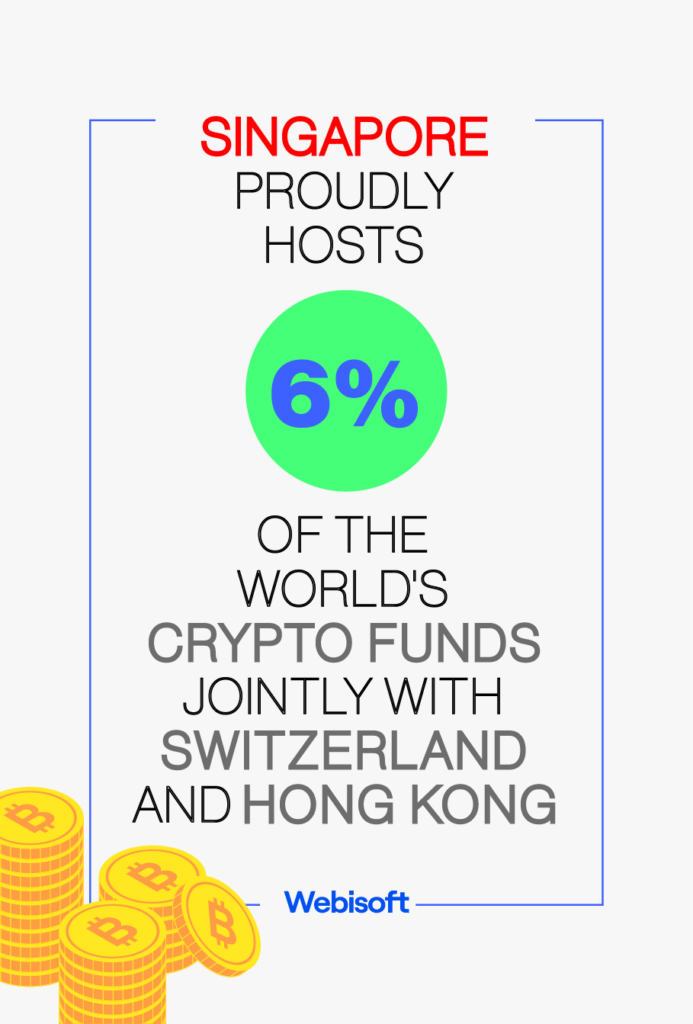
7. International Events Boost Hub Status
International events like Consensus Singapore and the Singapore FinTech Festival make Singapore a global hub for blockchain. These events attract big players in the industry.
8. Blockchain’s Impact on Singapore
Blockchain is changing industries in Singapore and helping the nation become a Smart Nation. With strong government support, a lively community, and a focus on education, Singapore leads in blockchain, setting an example for other countries.
How Does Blockchain Work: The Transaction Process
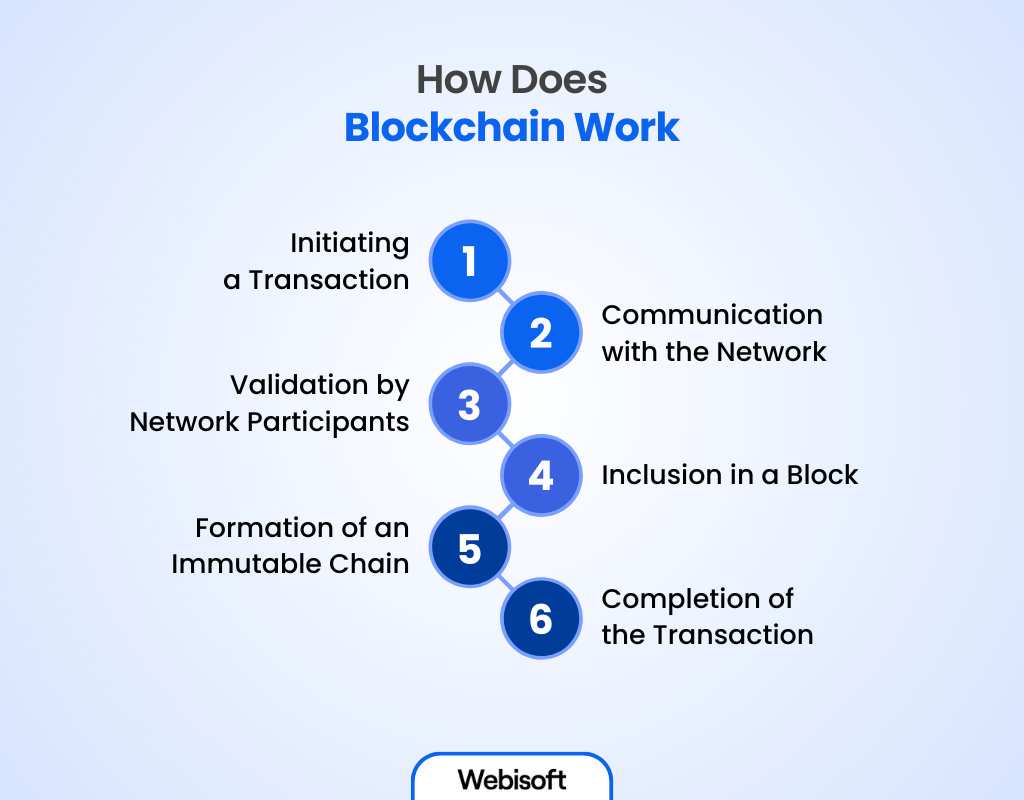
We can discuss the working process of blockchain in 6 steps. Let’s learn about it.
Step 1: Initiating a Transaction
The process begins when someone decides to make a transaction. This could involve transferring digital assets, executing a smart contract, or any other action within the blockchain system.
Step 2: Communication with the Network
Once the transaction is initiated, the details are sent out across the network. This network consists of a distributed group of computers, often referred to as nodes.
Step 3: Validation by Network Participants
The nodes in the network examine the transaction to ensure its validity. This validation process typically involves confirming the sender’s ability to make the transaction and checking if the digital signatures match.
Step 4: Inclusion in a Block
If the transaction passes the validation checks, it is then grouped with other validated transactions to form a block. This block is essentially a collection of transactions that are bundled together for efficiency.
Step 5: Formation of an Immutable Chain
The approved block is linked to the existing chain of blocks in a sequential and unchangeable manner. This chaining of blocks creates the “blockchain,” where each block contains a reference to the previous one, forming a secure and transparent ledger.
Step 6: Completion of the Transaction
With the inclusion of the block in the blockchain, the transaction is considered complete. It is now a permanent part of the decentralized and distributed ledger, visible to all participants in the network.
Blockchain Applications in Singapore
Blockchain technology is making significant strides in Singapore, with several applications gaining popularity. Here are some notable use cases:
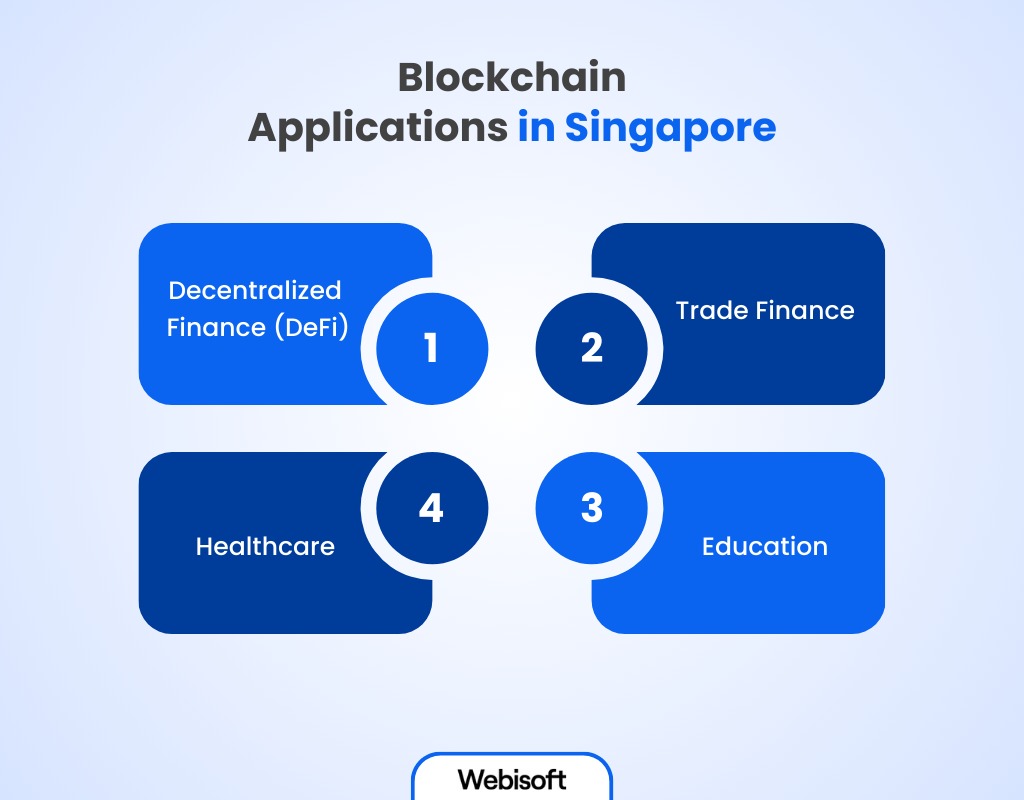
1. Decentralized Finance (DeFi)
DeFi represents a financial system powered solely by smart contracts, eliminating the need for external approvals from banks or insurance companies. This approach enhances efficiency, transparency, and security.
Cake DeFi: This platform allows users to generate cash flow from cryptocurrencies, blending DeFi and centralized finance (CeFi) for enhanced security. Transactions within its Lapis service are hashed and publicly disclosed, ensuring tamper-proof data.
Zilliqa: Operating its own blockchain platform, Zilliqa boasts scalability through its unique sharding technique. Plans for decentralized exchanges via stablecoin, especially XSGD, leverage smart contracts for managing cross-border and P2P transactions.
2. Trade Finance
Trade finance involves global commerce facilitated by financial instruments like Letters of Credit (LC) and Bills of Lading (BL). Integrating blockchain in trade finance reduces costs, enhances efficiency, and opens avenues for new revenue streams.
Singapore Trade Finance Registry (TFR): To combat trade fraud, the Monetary Authority of Singapore (MAS) collaborated with 14 banks to establish a digital Trade Finance Registry (TFR). This registry enables banks to verify if required financial documents have been submitted by other institutions, promoting transparency and confidentiality.
3. Education
Digital Certificates: Universities and employers can now swiftly verify students’ qualifications using blockchain IDs. Students can publish their certificates on platforms like LinkedIn, eliminating the need for physical copies.
Blockchain is transforming education in Singapore, replacing the need for physical copies of certificates with efficient and secure digital verification through smart contracts.
4. Healthcare
Blockchain ensures the security and privacy of healthcare data, mitigating concerns about data breaches.
Digital Health Passport: This initiative allows citizens to store healthcare information in a blockchain-supported digital wallet. Citizens gain easy access and control over their health data while reducing reliance on physical documents prone to loss or replication.
Blockchain and Bitcoin Courses in Singapore
To improve the overall blockchain sector, different institutions in Singapore are also actively launching blockchain courses. Here we’ve gathered 6 such blockchain courses Singapore. Let’s get to know about them

| No. | Course Title | Course Fee |
| 1. | Basic Blockchain and Bitcoin Course | S$300 |
| 2. | Blockchain – Embarking on the Journey (SMU) | S$856 |
| 3. | Decentralized Finance: A New Financial Ecosystem | S$2160 |
| 4. | Introduction to Blockchain with Ethereum & Solidity | S$481.50 |
| 5. | FinTech Expertise (Singapore Polytechnic) | S$2450 |
1. Foundational Course: Basic Blockchain and Bitcoin Course
Enroll in this thorough course to build a strong understanding of the technology that powers Bitcoin and blockchain. Explore the features of Bitcoin and grasp the fundamental concepts of blockchain technology, including its two primary consensus mechanisms. This course is perfect for IT professionals and cryptocurrency enthusiasts looking to broaden their knowledge.
Course Fee: S$300
2. Business Applications: Blockchain – Embarking on the Journey
Offered by the prestigious Singapore Management University (SMU), this one-day course is designed for professionals looking to leverage the potential of blockchain in the business realm. Dive into diverse use cases and real-world examples that illustrate the practical adoption of blockchain technology
Course Fee: S$856 per participant
3. Decentralized Finance: A New Financial Ecosystem
This two-day course, also provided by SMU, focuses on the disruptive force of FinTech in the financial industry. Guided by blockchain experts, the program provides valuable insights into the dynamic FinTech landscape, covering aspects such as regulations, ecosystems, and emerging trends.
Course Fee: S$2160
4. Hands-on Development: Introduction to Blockchain Technology with Ethereum & Solidity Smart Contracts
For software developers in financial services, Temasek Polytechnic offers a beginner’s introduction to blockchain technology. This hands-on training program guides participants through the setup of an Ethereum Node and enables them to write and execute their first smart contracts as decentralized applications (dApps) on web browsers.
Course Fee: S$481.50 | Certification: Accomplishment Certificate (minimum 75% course attendance)
5. FinTech Expertise: Singapore Polytechnic
This comprehensive course equips FinTech professionals with essential skill sets needed in the industry.
Learn from industry leaders, gain insights into the latest trends, and collaborate on a capstone project to create and pitch a corporate innovation start-up. Develop the expertise required to thrive in the dynamic and fast-paced FinTech ecosystem.
Course Fee: S$2450 | Certification: Performance Certificate
Industries Leveraging Blockchain in Singapore
Speaking at the Singapore Week of Innovation & Technology, Enterprise Singapore Chairman Peter Ong said, “Blockchain has proven itself as a powerful innovator’s tool that can transform industries.” And that’s what we can notice in several industries of Singapore.

Let’s check out some examples.
Finance and Banking
In the finance and banking sector, Singapore has been a pioneer in embracing blockchain technology. This innovation has transformed various aspects, including cross-border payments, trade finance, digital identity verification, and regulatory compliance.
For instance, platforms like RippleNet, based on blockchain, have revolutionized cross-border transactions. They offer a swift and cost-effective alternative by bypassing intermediaries, leading to reduced transaction times.
In trade finance, solutions such as TradeTrust leverage blockchain to enhance transparency. This not only provides secure documentation but also reduces the risk of fraud through an immutable record.
Digital identity verification platforms, like KYC Blockchain, use blockchain to securely store and verify individuals’ credentials. This not only improves efficiency but also plays a crucial role in minimizing fraud within the financial sector.
Supply Chain Management
Blockchain has introduced unprecedented visibility and efficiency to supply chain management in Singapore.
By establishing an unchangeable record of every transaction and the movement of goods, blockchain facilitates real-time tracking, mitigates counterfeiting risks, and ensures the integrity of the entire supply chain ecosystem.
As an example, the Singapore-based startup DLT Ledgers has developed specialized blockchain software tailored for the supply chain industry.
Their innovative solution, recognized with the esteemed CXO Honour award for Best Blockchain App for Supply Chain, guarantees secure and immutable end-to-end traceability records. Through advanced mathematical algorithms, DLT Ledgers effectively prevent product fraud, offering protection to both businesses and consumers.
Real Estate
The real estate industry in Singapore is incorporating blockchain technology to simplify processes and increase transparency. Blockchain streamlines property transactions by automating tasks and ensuring the precision of property ownership records.
Take Averspace, for instance, a real estate platform that leverages blockchain to facilitate seamless renting and selling of properties. Similarly, Fraxtor acts as a digital platform bridging investors and real estate investment opportunities.
Moreover, the implementation of blockchain in land registries enhances transparency and diminishes the risk of fraud in property transactions. This technology is making waves in Singapore’s real estate sector by introducing efficiency and trustworthiness into various aspects of property dealings.
Government/Public Sector
Governments worldwide, including Singapore, recognize blockchain’s potential to enhance public sector operations. Following examples like Georgia and Estonia, Singapore is actively considering blockchain adoption for administrative functions.
Singapore’s Public Service Division plans to utilize blockchain in sectors like verifying vendor records on Gebiz, the government’s e-procurement portal, aiming to boost transparency and accountability in purchasing.
Blockchain technology also has the potential to revolutionize government auditing, improving efficiency and reducing fraud risks. In Singapore, the customs authority has launched the Network Trade Platform (NTP), a blockchain-based system streamlining trade processes for enhanced efficiency and transparency.
Education
Blockchain technology has the potential to transform how educational credentials are handled in the education sector, offering a secure and decentralized system for storing, verifying, and sharing diplomas, degrees, and certifications.
Ngee Ann Polytechnic (NP), a prominent educational institution in Singapore, has embraced blockchain to ensure the authenticity of its diplomas, making it a trailblazer in the education industry. Established in 1963, NP is at the forefront of leveraging blockchain technology.
Similarly, the National University of Singapore (NUS) has taken proactive measures to integrate blockchain technologies into its curriculum. NUS not only provides classes on blockchain technologies but has also collaborated with IBM to develop a comprehensive curriculum focused on distributed ledger technologies.
These initiatives by NP and NUS underscore the importance that Singapore’s educational institutions place on blockchain. Their goal is to enhance the credibility and accessibility of academic records, benefiting both students and employers with verified and unalterable educational credentials.
Airline Industry
Blockchain technology holds great potential for the airline industry, offering advantages such as increased transparency, streamlined operations, and a better customer experience. By leveraging blockchain, airlines can establish a secure and decentralized platform to handle passenger data, ticketing, and loyalty programs.
An illustration of this is SITA, a global IT provider for the airline industry, which has introduced FlightChain, a blockchain-based platform. FlightChain securely stores and shares flight data among stakeholders, mitigating the risk of data discrepancies and enhancing operational efficiency.
Food Industry
According to info from the World Health Organization (WHO), almost 1 in 10 people get sick each year from eating contaminated food.
To tackle this, using blockchain in the food industry can give suppliers and consumers reliable info about food, like where it comes from. The Intellectual Property Intermediary (IPI) in Singapore, linked with the Ministry of Trade and Industry, is into a blockchain food project. It wants to create a system to track info about materials and products all along the food production chain, with everyone involved.
Internationally, Walmart is already using a blockchain system to track food from where it’s made to where it’s sold. This gives real-time info about the supply chain and helps quickly recall products if there’s a safety issue.
With blockchain, this system manages data super well and sticks to high standards for storing info. This way, it keeps food quality high, ensures safety, and cuts down on food waste.
Healthcare
Singapore’s government-owned deep technology firm, SGInnovate, has invested in MediLOT Technologies, a startup specializing in blockchain and healthcare analytics. MediLOT employs a dual blockchain system with a unique layered architecture, integrating Artificial Intelligence (AI) and data analytics in its control and data layers. This facilitates the development of machine learning APIs and complex applications on the MediLOT platform.
MediLOT Technologies aspires to create an interoperable decentralized platform tailored for the healthcare industry. This platform enables healthcare institutes to extract information from healthcare records, enhancing the effectiveness of treatments and diagnoses for patients.
In the pharmaceutical sector, the company named “BlockVerify” actively participates in tracking medical products within supply chains to ensure patients receive the correct medications.
Energy
The energy sector is actively exploring blockchain technology to revolutionize traditional energy systems into decentralized and more efficient networks. Blockchain introduces possibilities like peer-to-peer energy trading, where individuals can directly buy and sell excess energy without intermediaries, fostering greater energy independence.
Moreover, blockchain-based smart contracts can automate energy transactions, ensuring the secure and transparent execution of agreements. Platforms like Power Ledger and Electrify leverage blockchain for peer-to-peer energy trading, allowing renewable energy producers to tokenize and directly sell their energy to consumers.
The Future of Blockchain Technology in Singapore: How Much Will It Evolve?
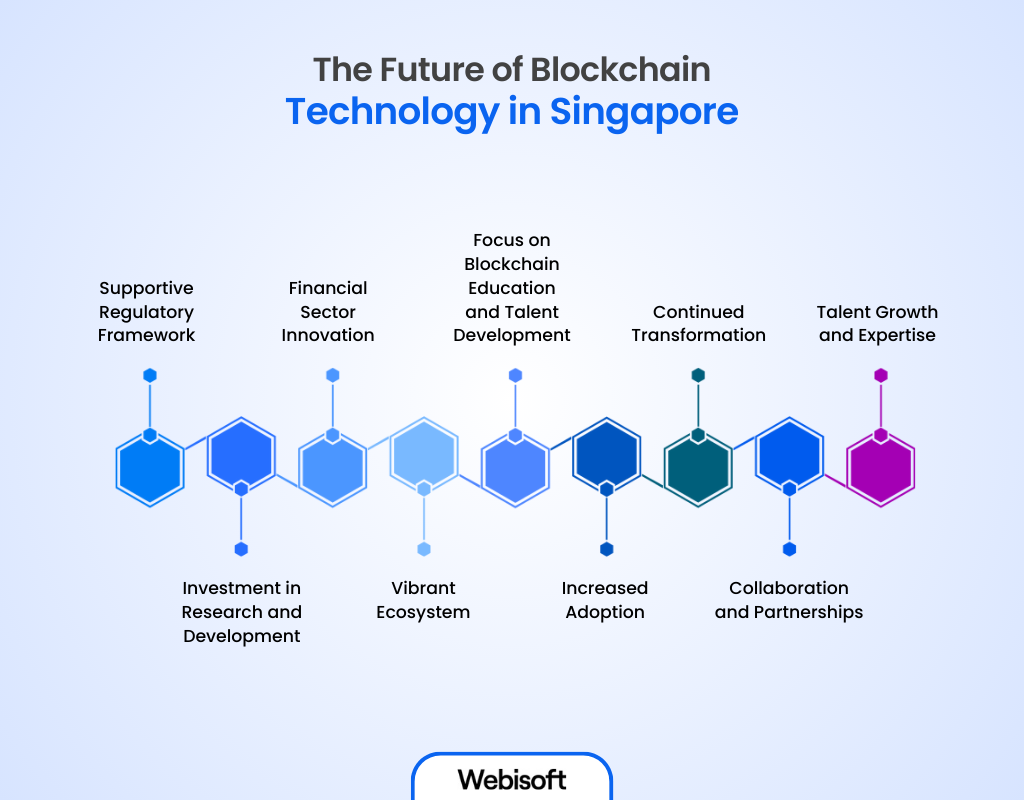
The key factors driving the future evolution of blockchain technology in Singapore include:
Supportive Regulatory Framework
The government has introduced guidelines and initiatives that provide clarity and promote responsible blockchain adoption.
Investment in Research and Development
Singapore actively invests in research programs and partnerships to explore new use cases and develop cutting-edge solutions.
Financial Sector Innovation
The Monetary Authority of Singapore (MAS) is leading the way in revolutionizing payment systems and cross-border transactions through projects like Project Ubin.
Vibrant Ecosystem
Singapore is home to numerous blockchain startups, incubators, and accelerators, supporting innovation and collaboration within the industry.
Focus on Blockchain Education and Talent Development
Institutions like Singapore Management University (SMU) and the National University of Singapore (NUS) offer specialized courses and training programs to nurture a pool of blockchain experts.
These factors combine to create a robust foundation for the future of blockchain technology in Singapore. As the technology evolves, we can expect to see:
Increased Adoption
With a supportive regulatory environment and innovative use cases, blockchain solutions will be embraced by more industries seeking enhanced efficiency, security, and transparency.
Continued Transformation
Ongoing research and development efforts will lead to the creation of new blockchain applications and advancements in areas such as smart contracts, decentralized finance (DeFi), and supply chain management.
Collaboration and Partnerships
Singapore’s ecosystem encourages collaboration among stakeholders, prompting partnerships between startups, established businesses, and government entities to drive blockchain innovation.
Talent Growth and Expertise
The focus on blockchain education and talent development ensures a steady supply of skilled professionals who can contribute to the ongoing evolution of blockchain technology.
Singapore Blockchain Innovation Programme: Blockchain Incubator Program
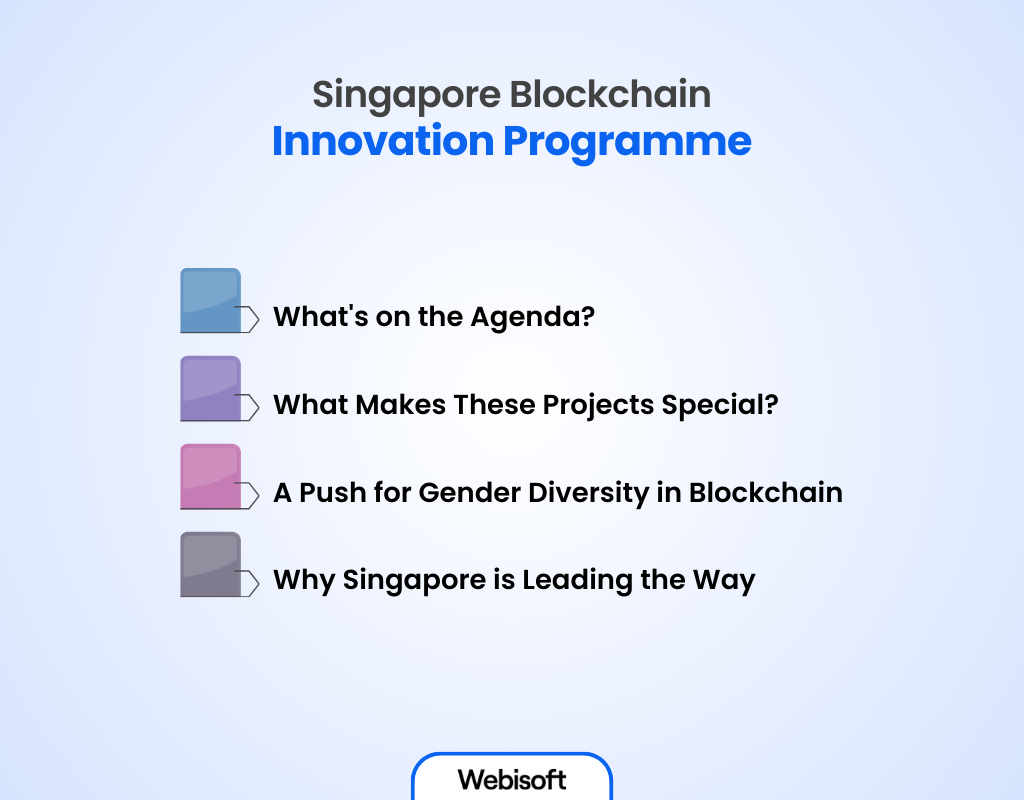
Singapore, known for its active role in blockchain, has introduced an exciting initiative to support budding blockchain startups. The newly launched Blockchain Incubator Program, named LongHash Hatch, is a 12-week initiative aiming to turn five promising blockchain ideas into real products with market potential.
What’s on the Agenda?
These five projects will undergo rigorous testing to see if they’re not just good ideas but can actually make a meaningful impact. LongHash, a major player in the blockchain scene with a global presence, is leading this initiative in collaboration with Enterprise Singapore.
What Makes These Projects Special?
The chosen projects stood out for their robust business plans, skilled teams, industry expertise, and positive feedback in the market. They span a range of exciting blockchain applications, from a green energy certificate marketplace to a smart cryptocurrency wallet and an online system using biometrics for identity verification.
A Push for Gender Diversity in Blockchain
Interestingly, only 34% of cryptocurrency owners are female. LongHash Hatch aims to change that by encouraging more women to explore the world of blockchain technology. The program provides crucial support in areas like fundraising, marketing, branding, and administration to boost the growth and success of projects led by women.
Why Singapore is Leading the Way
Singapore is eyeing a leadership role in the blockchain space and is actively supporting innovative ideas to strengthen its position as a global hub for transformative blockchain technology.
Best Blockchain Development Company in Singapore: Webisoft
Webisoft stands out as Singapore’s top-tier blockchain development company, known for its expertise in Solidity and Ethereum Layer 2 technologies. Recognized as one of the top blockchain companies in Singapore, they offer a wide range of services tailored to different industries.
Distinguished for its exceptional skills and track record, Webisoft has become synonymous with excellence in blockchain development.
Known as the best in Singapore adds an extra layer of credibility, showcasing their global standing. Webisoft excels in blockchain development, contributing to Singapore’s dynamic blockchain world with client-focused solutions and innovative expertise, establishing trust as a dependable partner.
Why Choose Webisoft?
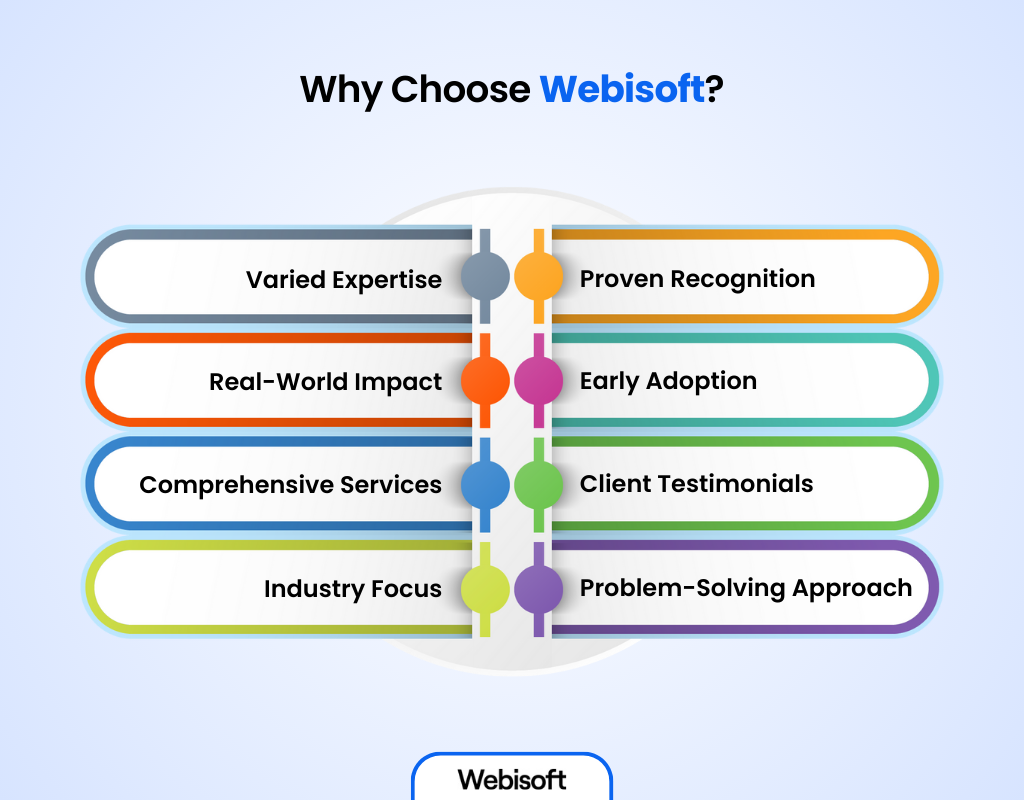
When it comes to blockchain development in Singapore, Webisoft is your go-to choice for several compelling reasons. Let’s see why Webisoft is one of the best Singapore blockchain companies.
Varied Expertise
Webisoft brings a wealth of expertise in a range of blockchain technologies, making it versatile in meeting diverse client needs. From Solidity and CosmWasm to Ethereum Layer 2 and more, their team is well-equipped.
Proven Recognition
Recognized as the top blockchain development company by Clutch, Webisoft’s reputation speaks volumes. Client satisfaction and trust are evident in this acknowledgment.
Real-World Impact
Webisoft’s success stories like STYLLAR and KRYPTIC showcase their knack for turning blockchain ideas into practical applications. Whether it’s NFT marketplaces or revolutionary financial projects, they’ve got a track record of making an impact.
Early Adoption
Being early adopters of blockchain tech means Webisoft stays ahead of the curve. Clients benefit from a team that embraces innovation in the ever-evolving tech landscape.
Comprehensive Services
Webisoft offers a full suite of blockchain services, covering consulting, custom development, smart contracts, DeFi solutions, NFT development, dApp development, and more. It’s a one-stop shop for all your blockchain needs.
Client Testimonials
Positive feedback from clients, like Pascal Goovaerts from Proprio Direct, highlights Webisoft’s deep understanding of blockchain technology. Clients appreciate their ability to navigate and deliver successful projects.
Industry Focus
Webisoft provides blockchain solutions to various industries, including Fintech, governance, healthcare, and retail. This sector-specific approach ensures solutions that align with unique industry requirements.
Problem-Solving Approach
Webisoft is committed to solving real-world challenges for both big enterprises and startups globally. Their approach is about delivering affordable, customized, and highly effective blockchain solutions.
Final Words
In summary, blockchain is on the rise in Singapore for several reasons and it is just growing. The government’s initiatives like Project Ubin and the Blockchain Challenge, along with strong regulations, have fostered a supportive environment.
We’ve also explored how Singapore’s progress in blockchain sets an example globally, making it a hub for innovation and growth.Finally, we’ve discussed why Webisoft became the best blockchain development in Singapore.

